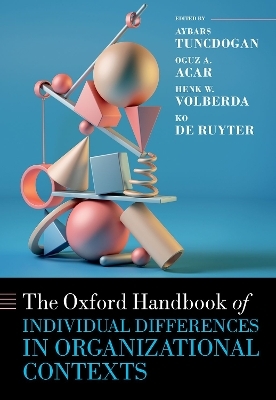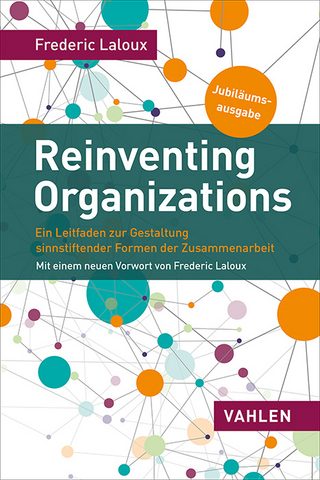
The Oxford Handbook of Individual Differences in Organizational Contexts
Oxford University Press (Verlag)
978-0-19-289711-4 (ISBN)
The Oxford Handbook of Individual Differences in Organizational Contexts reviews the individual differences, paying attention both to psychological differences (e.g., personality traits, dark personality traits, intelligence types, self-monitoring, chronic regulatory focus) and biological/physiological differences (e.g., sex, age, facial morphology, genetic differences, neurological differences). In doing so, it serves two purposes. First, it aims to help decrease fragmentation in the field, and facilitate discussions among different streams of research within this literature. Secondly, it aims to render this literature more accessible to academics and students wishing to deepen their understanding of individual differences.
Comprising twenty-six chapters authored by fifty-seven esteemed academics, this book facilitates readers in comprehending the key findings, questions, and future research areas of individual differences research in organizational contexts. This book can be of interest also to practitioners that need a deep understanding of individual differences, such as HR managers and recruiters.
Aybars Tuncdogan is a Senior Lecturer (Associate Professor) in Marketing & Technology at King's Business School, King's College London. Prior to joining King's College London, he served as a Lecturer in Marketing & Strategy at Cardiff University and completed his PhD at the Rotterdam School of Management, Erasmus University. His research incorporates psychological constructs - particularly those from the traits and individual differences literature - with the aim of understanding, predicting, and shaping the strategic decisions of individuals and collectives, such as teams and organizations. He is also interested in the joint application of artificial intelligence and individual difference constructs within organisational contexts. Oguz A. Acar is Professor of Marketing & Innovation at King's Business School, King's College London. He is also a Research Affiliate at Laboratory for Innovation Science at Harvard University, an Expert at World Economic Forum and a Fellow of the Royal Society of Arts. He was recently named a World's Top 40 Business School Professors Under 40. His research is published in leading journals including Harvard Business Review, Journal of Management, Journal of Marketing Research, Psychological Science and Research Policy. He received several grants (worth £1M+) and was featured in popular outlets including Financial Times, Forbes, Fortune and Wired. Henk W. Volberda is Professor of Strategy & Innovation at Amsterdam Business School of the University of Amsterdam and Director of the Amsterdam Centre for Business Innovation. He is also a member of the supervisory board of NXP Semiconductors Netherlands and Apollo Tyres Netherlands, member of the scientific advisory committee of the Netherlands Defence Academy, expert member of the World Economic Forum, and a fellow of the European Academy of Management. Previously, he was vice-dean of the Rotterdam School of Management of Erasmus University and chair of the Department Strategic Management, board member of the Netherlands Centre for Social Innovation and Vice-President Research of the European Academy of Management (EURAM). Ko de Ruyter is Professor of Marketing and Vice Dean, Research at King's Business School. His research focuses on customer loyalty, marketing strategy, technology on the organizational frontline and social media. He has published widely in flagship academic business journals, such as the Journal of Marketing, Journal of Consumer Research and Management Science. For his leadership in the academic research community, Professor de Ruyter has been awarded a life-time achievement by the American Marketing Association. He also has proven experience in working closely with decision-makers in the private and public sectors, consulting on the challenges and opportunities that they face.
Part 1
1: The editors: Introduction
Part 2 The Role of Psychological Traits and Individual Differences in Organizational Contexts
2: Cameron J. Borgholthaus and Peter D. Harms: Scaling the Ivory Tower: The Organizational Consequences of CEO Personality
3: Mallory A. McCord and Bethany Westerberg: The Perceived Controllability of the Big Five Personality Traits at Work
4: Thomas G. Reio, Jr.: Individual Differences in Curiosity: Learning, Adaptation, and Work-Related Outcomes
5: The editors: IQ, EQ, and Multiple Intelligences: A Brief Review of the Discussion
6: Thomas Rockstuhl, Kok Yee Ng and Soon Ang: Cultural Intelligence and Personality: Differential Effects of Plasticity and Stability Meta-Traits
7: Aybars Tuncdogan, Paavo Ritala and Päivi Karhu: Managers' Regulatory Focus, Exploration-Exploitation and Temporal Ambidexterity: Towards a Conceptual Model of the Dynamic Relationship
8: Abraham P. Buunk: Individual Differences in Social comparison in Organizations
9: Peter D. Harms, Karen Landay and Tyler Fezzey: Explorations of the Shadow Realm: Examining the Role of Dark Personality in the Workplace
10: Destiny R. Hemsey and Jason J. Dahling: Moderating Machiavelli: How do Situational Characteristics Shape the Expression of Machiavellianism in the Workplace?
11: Aybars Tuncdogan, Frans van den Bosch and Henk Volberda: Prevention Focus as an Overlooked Benefactor: An Investigation into its Role as an Antecedent of Management Team Accountability
Part 3 Biological/Physiological Traits and Individual Differences in Organizational Contexts
12: Julie Aitken Schermer and Kristi Baerg MacDonald: Sex Differences in Vocational Interests: An Analysis of Cohorts
13: Katharina G. Kugler, Julia A. M. Reif & Jens Mazei: Gender Differences in Negotiations
14: Angela Shakeri and Michael S. North: Always at Greater Risk for More Discrimination? Comparing Older Women with Older Men in the Workplace Context
15: Terrance W. Fitzsimmons, Victor J. Callan, Miriam S. Yates and Ree Jordan: Why we still have gendered organisational progression of individuals into leadership roles and what can be done about it
16: Dawn L. Eubanks: Leadership Faces: Overlooking Good Leaders
17: Udari Ekanayake and Mariano Heyden: What do Celebrity CEOs Look Like?
18: William J. Becker, Kristina Cechova and Angela M. Passarelli: A Neuroscience Perspective on Individual Differences in Organizations
19: Wen-Dong Li, Zhaoli Song, and Richard Arvey: Organizational Research, Genetics, and the Possible Coming Era of Organizational Genomics
Part 4 Individual Differences in the Age of Technological and Social Disruption
20: Joanne Hinds: Digital data and personality - challenges and opportunities for organisations
21: Gerald Matthews, Peter Hancock, James Szalma, Jinchao Lin and April Rose Panganiban: Individual Differences in Teaming with Artificial Intelligence, Robots, and Virtual Agents in the Workplace
22: Christine Anderl: Individual Differences in Teleworking Outcomes
23: Uzay Dural and Selin Kudret: Self-Monitoring Personality Trait in Organisations: A Research Agenda for Self-Monitoring Effects in Remote Work, Leadership Diversity, and Beyond
24: Claudia Buengeler and Christoph Reinert: Diversity in Organizations: Understanding and Managing its Effects
25: Daniel A. Lerner, Carlina Conrad and Asya Karabayeva: Neurodiversity at work - the Illustrating case of ADHD in organizational behavior
26: Sandra E. Cha, Patricia Faison Hewlin & Laura Morgan Roberts: Fostering True Self-Expression in Organizations: A Metaphor-based Framework of Leader Authenticity Tensions
| Erscheinungsdatum | 17.02.2024 |
|---|---|
| Reihe/Serie | Oxford Handbooks |
| Verlagsort | Oxford |
| Sprache | englisch |
| Maße | 176 x 253 mm |
| Gewicht | 1052 g |
| Themenwelt | Wirtschaft ► Betriebswirtschaft / Management ► Planung / Organisation |
| Wirtschaft ► Betriebswirtschaft / Management ► Unternehmensführung / Management | |
| ISBN-10 | 0-19-289711-X / 019289711X |
| ISBN-13 | 978-0-19-289711-4 / 9780192897114 |
| Zustand | Neuware |
| Haben Sie eine Frage zum Produkt? |
aus dem Bereich


